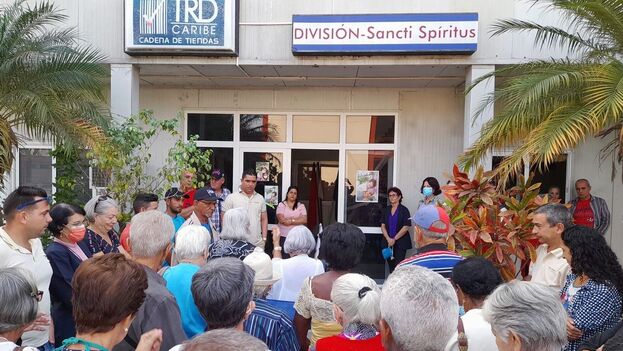
![]() 14ymedio, Mercedes García, Sancti Spíritus , 11 February 2023 — A call, the summons to a meeting or the simple phrase “the director wants to see you” make the workers of the province of Sancti Spíritus tremble these days. The state companies in the territory are taking on water and, forced to reduce their workforce due to the drop in income, the number of layoffs only grows.
14ymedio, Mercedes García, Sancti Spíritus , 11 February 2023 — A call, the summons to a meeting or the simple phrase “the director wants to see you” make the workers of the province of Sancti Spíritus tremble these days. The state companies in the territory are taking on water and, forced to reduce their workforce due to the drop in income, the number of layoffs only grows.
In the Caribe Store Chain that manages part of the sale of food in the city of Sancti Spiritus, the employees have raised their voices to heaven. The brigades of stevedores that brought in the trucks with merchandise to unload the products in each trade have been deactivated, as confirmed by a company executive.
“Now it’s up to the store workers themselves, storekeepers and the personnel that deals with sales to the public, to unload the merchandise from the trucks, that is, to do the work that the stevedores did before,” the official details. “All this is based on Decree Law 53 of 2021,” he points out.
The regulation, approved by the Council of Ministers, creates greater flexibility in the mechanism to establish the organization of the salary system of the workers of state companies, and gives greater decision-making capacity to local managers. “In principle it sounds good, but what is happening is that they are laying off staff to adjust the numbers, instead of producing more; they are adjusting the accounts by removing people.”
When Decree Law 53 entered into force, many workers felt hopeful that the new legislation would help raise wages, but the reality has been quite different. “It leaves the hands of company directors and administrators free to readjust the workforce at will, they raise the salaries of some, but by leaving others without work,” laments this worker at the Caribe Chain Store in Sancti Spíritus.
Doubts about the application of the regulations were felt from the beginning. Last September, Guillermo Sarmiento Cabanas, director of Labor Organization, and Edith González, head of the Department of Salary Organization of the Ministry of Labor and Social Security, had to answer, in the official press, the questions that were already arising about the new Decree.
The functionaries then assured that “the essence” of the change in legislation was “to transform the company, since to pay more it must obtain better results,” which they synthesized “in the formula more productivity plus efficiency plus salary.” But in reality, the directors of state entities seem to have opted for the easier way: fewer employees equals more money to distribute among those who remain.
At the Base Tiles Business Unit, belonging to the Sancti Spíritus Construction and Assembly Company, a process of eliminating jobs began at the end of last year. “They summoned us to tell us that they cannot continue paying all the salaries and we have to reduce staff,” one of the affected workers told 14ymedio. “But it won’t be easy for those who stay,” he stresses.
The directors of the state entity have not only significantly cut the workforce but have warned the workers who keep their jobs that now “they will have to work more” and take on “up to two responsibilities” in the tile manufacturing line. A measure that has been criticized by the employees who, however, do not find support in the local union.
“You spend your life paying union dues, but when you need the Union to stand up for you, then they do nothing,” laments another worker in the administrative area of this tile industry; one of the workers who was counted among the “interrupted workers,” the euphemism used by the Cuban government for the unemployed.
But not all the dismissed are a response to Decree Law 53; the lack of income and raw materials also raise the number of dismissals. In the asphalt plant in the city of Sancti Spíritus, located in the Chambelón neighborhood, this newspaper reported last January on the paralysis of the industry, equipped with old machinery, the Ukrainian-made DK-117 model, which arrived on the island during the years of Soviet subsidy.
The passing of the years, the deterioration and the shortage of parts took their toll on the plant, but the final blow has been given by the lack of fuel and materials. “Since April of last year, production began to decrease because we did not have materials for the process, although it was only a few days ago, at the beginning of this year, that it was announced that it was going to stop producing,” one of the employees told 14ymedio. After the closure of the factory, that employee has been left without work.
The options for finding a job in a province hit by the economic crisis and unproductiveness are “like finding water in the desert,” the same worker now quips, and reports that he has been “searching and searching for months and nothing appears.”
For most of the unemployed, however, there is at least one thing in which they feel very secure: “I won’t return to the state sector anymore, they use you when they want and throw you away for whatever. Now I’m going to earn a living selling churros or unclogging toilets, but on my own,” says the employee.
____________
COLLABORATE WITH OUR WORK: The 14ymedio team is committed to practicing serious journalism that reflects Cuba’s reality in all its depth. Thank you for joining us on this long journey. We invite you to continue supporting us by becoming a member of 14ymedio now. Together we can continue transforming journalism in Cuba.
